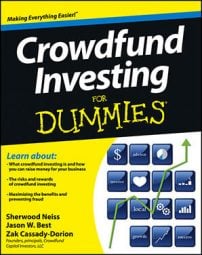Should you look to crowdfund investing to completely replace your need for bank loans? Probably not, even if you opt for a debt-based crowdfund investment structure. Instead, your goal may be to seek a combination of both types of financing (in addition to self-funding and any other financial resources you can muster).
Bank loans have traditionally been a source of capital for small businesses, but one of the reasons that Title III of the JOBS Act passed is that banks are not lending like they used to. Capital is not flowing from the people who have it to the people who can use it to grow businesses and create jobs.
![[Credit: ©iStockphoto.com/Kirby Hamilton]](https://www.dummies.com/wp-content/uploads/335407.image0.jpg)
To qualify for a bank loan these days, you likely need a lot of collateral to secure your loan, three years of business financials to support your case, and an ongoing relationship with your bank. If you’re an entrepreneur or a new small business owner, chances are, you don’t meet these qualifications.
Furthermore, with the financial collapse in 2008, banks started charging a much higher interest rate on the money they lend to businesses. Even if you do meet the loan qualifications, you need to seriously study the interest rate that a bank is going to charge you and make sure that your revenues can meet your debt obligations.
If the loan repayment is going to put too much financial (and personal) stress on you and your business, it will distract your attention from focusing on growing your business.
Crowdfund investments can be structured in various ways to suit the specific needs of your business. In many cases, a crowdfund investment campaign will offer investors an equity stake in the operation (meaning, they own stock in your company and earn dividends if you make a profit).
However, your campaign could be structured so that your crowd is actually giving you loans, and you’re repaying those loans with interest over a set amount of time.
Clearly, the way in which you choose to structure your campaign determines whether your crowdfund investments closely mirror the services that banks provide through small business loans (in the case of debt-based crowdfund investing) or are quite distinct from bank loans (in the case of equity-based investments).

